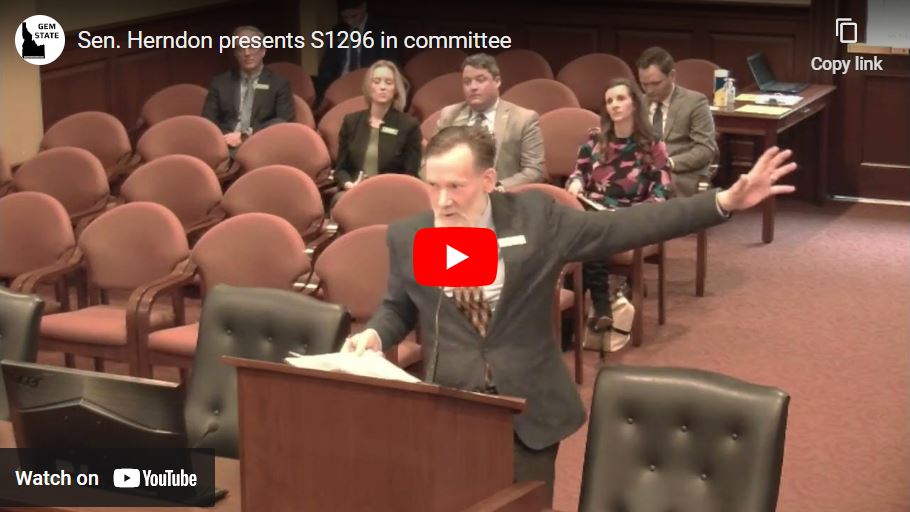
The Idaho Republican Platform
What is it, what’s it for, and what’s new?
By Brian Almon
It was a neat experience to serve as secretary of the Platform Committee at the 2024 Idaho GOP Convention. It was a bit of a last minute thing, with chair Bjorn Handeen calling me on the way to Coeur d’Alene to ask if I was willing to take on the job. Just when I thought I was done taking minutes, they pull me back in!
The makeup of the committee was balanced, both geographically and ideologically. Rep. Steve Miller and Sen. Kevin Cook were both very active in debate, as was former state senator Dean Mortimer. Nina Beesley of Rathdrum and Colton Bennett of Moscow were active participants, as were Ada County Commissioner Ryan Davidson and Michael Chew of Eagle. Ben Fuhriman, who defeated Rep. Julianne Young in district 30 by two votes, pending a recount, also participated in discussions.
Lt. Gov. Scott Bedke and Rep. Rod Furniss were assigned to the committee, but did not attend either on Thursday or Friday.
17 platform proposals were submitted to the committee, and 11 were passed to the main body of the convention for ratification. After some debate on Saturday morning, 10 were passed and will be integrated into the new platform. (Branden Durst’s proposed new forward was amended in committee and then struck on the floor by Durst himself, who said he would rather it not pass if he wasn’t able to undo the committee’s amendments.)
Let’s go through them one at a time:
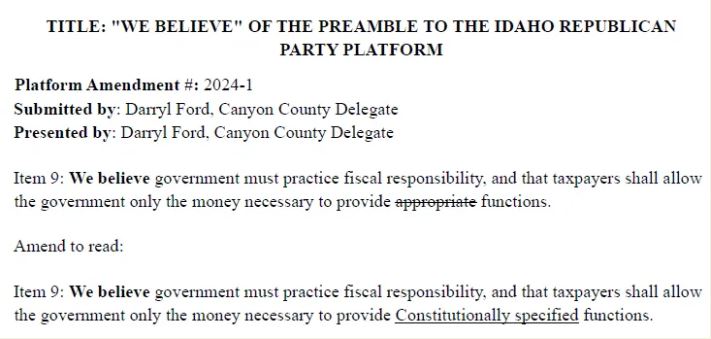
Darryl Ford of Canyon County submitted this proposal which simply changes “appropriate” to “Constitutionally specified”. It’s a subtle change, but a good reminder that appropriations should be in line with the enumerated powers of our state and federal constitutions.
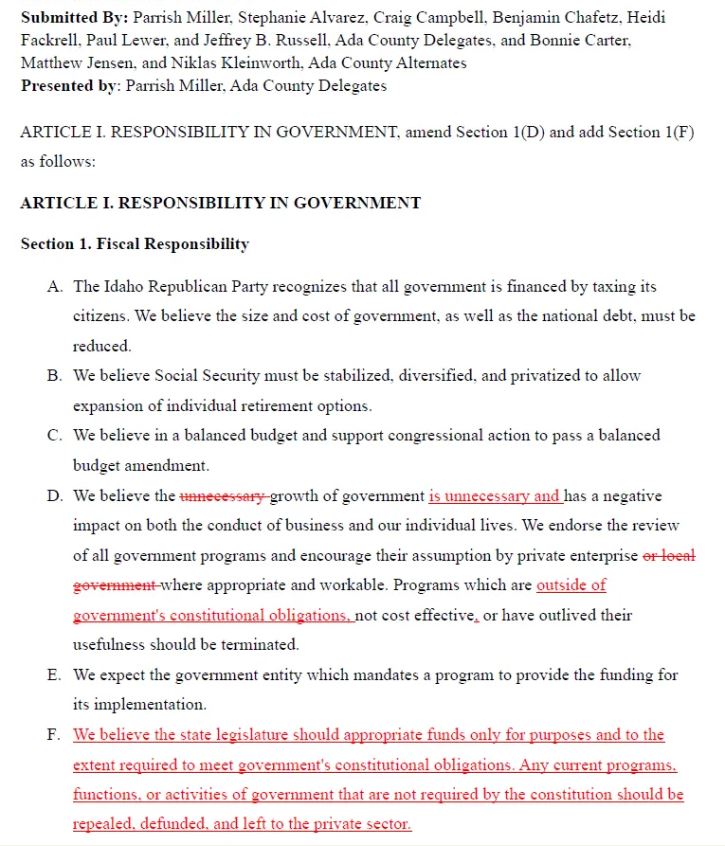
Sen. Cook debated against this in committee, pointing out that as Idaho’s population grows, so too do government services. He’s right, but I think where the authors were coming from was to draw a line against further encroachment of government into the private sector. I believe it was Rep. Miller who pointed out that the government already funds things that are not explicitly mandated by our constitution, such as prisons. Perhaps that is a discussion we need to have — maybe those things that are not specifically mandated should be operated by the private sector, or on the other hand they should be amended into the constitution.
Sen. Cook and Rep. Miller succeeded in stopping 2024-4, which would have changed a line in the platform about reducing income taxes to one that calls for their abolition. They explained that income taxes currently fund about a third of the government, and that removing them would necessarily cause taxes to increase.
This raises the question of the purpose of the platform. If it’s a high level philosophical statement, then putting in a stretch goal of abolishing income taxes sounds reasonable. However, if it’s a strict metric that is used to determine the faithfulness of our Republican legislators, then such a line might only serve to cause division. It could be used against any Republican who votes for lower income taxes, since that stops short of full abolition.
The platform can be a high level statement of philosophy, or it can be a strict metric, but it cannot be both at the same time, and that’s something we as Republicans need to figure out soon.

Proposed central bank digital currencies as well as decentralized digital currencies such as Bitcoin are hot topics right now. Last year, the Legislature failed to pass two different bills to protect Bitcoin mining from burdensome fees and regulations. The Idaho GOP platform has long called for a return to the gold standard, but this is the first time it makes a statement regarding digital currencies.
To get a good idea of where the debate over Bitcoin is going, check out Sen. Scott Herndon’s presentation of S1296 before the Senate Commerce & Human Resources Committee from the last session. Sen. Cook chaired that committee, which also featured testimony from Idaho Freedom Foundation’s Niklas Kleinworth and Dennis Porter of Satoshi Action, an organization promoting digital currency policies.
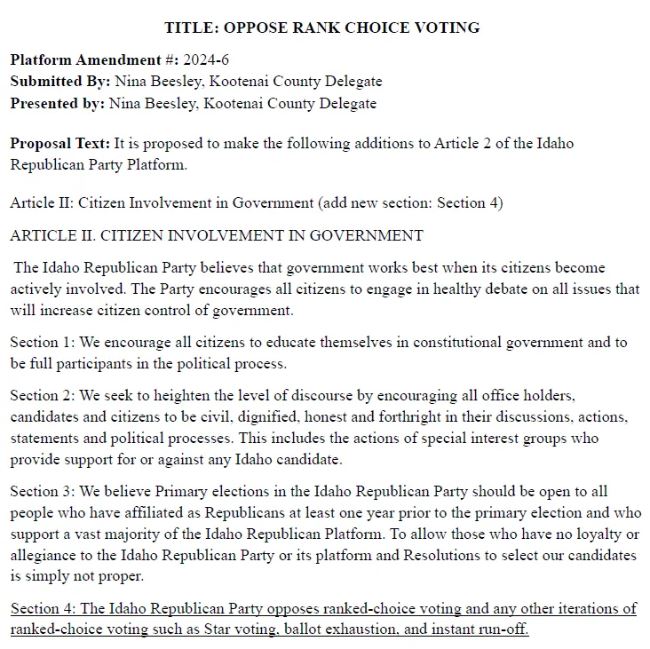
This proposal initially simple said that the Idaho GOP opposes ranked choice voting, but members of the committee amended it to include other similar ideas. Ada County Commissioner Ryan Davidson double checked that it would not impact runoff elections as practiced by many cities throughout Idaho. Runoffs are different than ranked choice voting or instant runoffs in that they give the final two candidates time to campaign.
The Idaho GOP spearheaded a law against ranked choice voting in the 2023 legislative session, and has now adopted that position in its platform. The national Republican Party also opposes ranked choice voting. It’s time for all Republicans to come together to oppose this radical alteration of the way in which we vote.
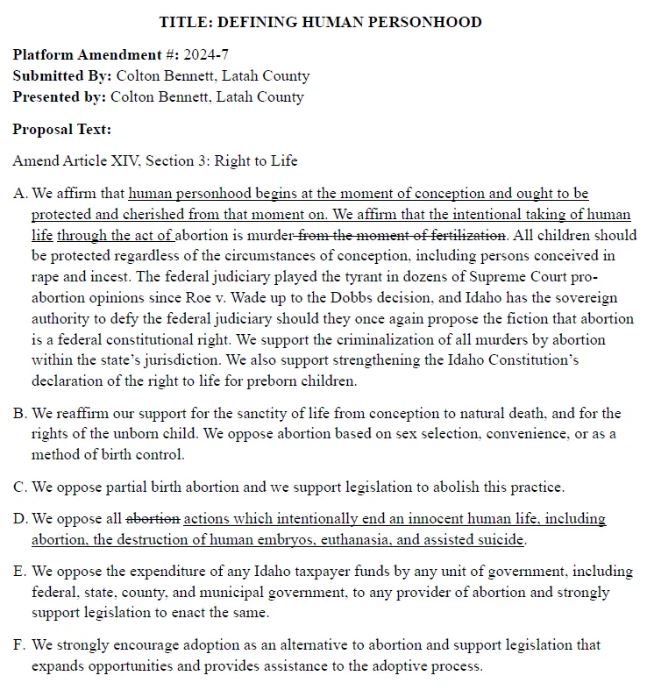
Colton Bennett’s proposal strengthened the Idaho GOP’s position on human life. We now explicitly oppose all abortion, euthenasia, as well as any procedure that intentionally destroys fertilized human embryos. There was some opposition to this in committee with regards to in-vitro fertilization, but the plank passed nonetheless.
IVF is a big debate right now. Typically, an IVF procedure will fertilize many eggs, and then either freeze or destroy the leftover embryos. Should we as pro-life Republicans support or oppose this? It’s a complex issue that is being debated across the country as we speak. Children’s rights advocate Katy Faust has written about why we should oppose it, so check out her argument and give it some thought.
Note that the platform does not oppose IVF in general, only the “destruction of human embryos.” Is there a way to use IVF without creating and discarding extra embryos? I don’t know.

Nina Beesley has been on the front lines of the battle to remove sexually explicit materials from the children’s shelves in libraries for a long time, and this addition to the platform strengthens our resolve to protect childhood innocence in all areas. The proposal passed without opposition.

With the federal government continuing to allow the invasion on our southern border, and with President Biden about to issue an executive order granting amnesty to hundreds of thousands of illegal aliens, it’s more important than ever for states to take action to protect their own citizens. Gov. Brad Little has expressed support for Texas Gov. Greg Abbott’s efforts to protect the border, and the House passed a bill last session to allow Idaho law enforcement to begin the process of deporting illegals. This is a good addition to the platform.
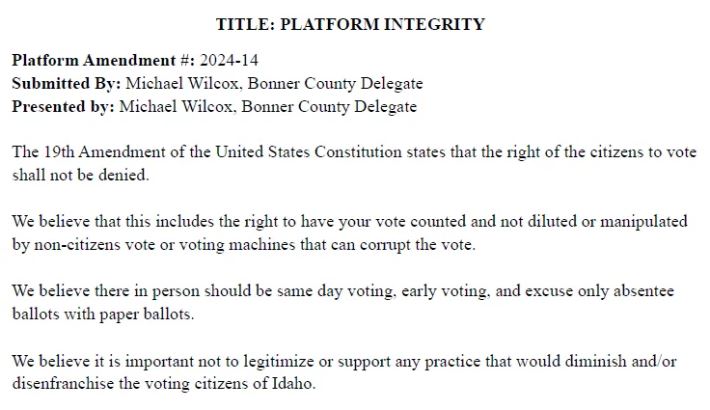
This proposal saw perhaps the most debate in committee — my minutes for this one take up an entire page. The original proposal had a clause that called out crossover voting, but this was struck by the committee, believing that such language was already elsewhere in the platform and did not need to be repeated.
Much of the debate over this proposal was over how expansive our voting system should be. There is a balance to be found between convenience and security. Many Republican voters believe that we should make voting as convenient as possible, including expanding the use of mail-in ballots. On the other hand, many outspoken Republicans want in-person same-day voting only.
Note the typographical error in the third paragraph. It should read “We believe there should be in person, same day voting…” but I inserted “in person” at the wrong spot. It was late and I was tired, but hopefully that was my only error.
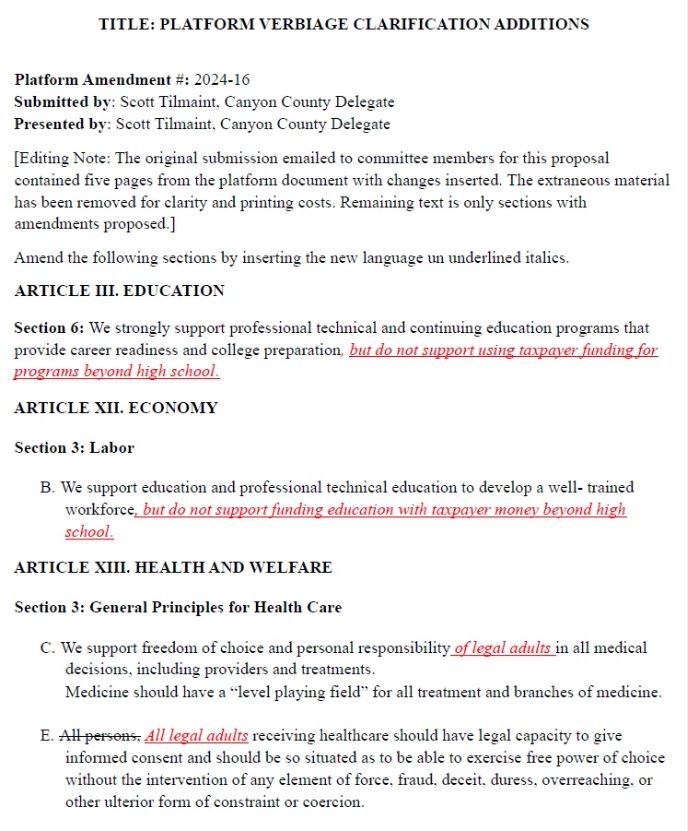
This proposal received a lot of debate both in committee and on the floor. Sen. Cook correctly pointed out that taxpayers currently fund a lot of higher education programs, not just the Launch Grant. Taxpayers subsidize state colleges and universities such as Boise State University and North Idaho College, where the general sessions of the convention were held. There are also numerous grants and scholarships that are taxpayer funded as well.
Once again, this raises the question of the purpose of the platform. As a philosophical statement, it should spur discussion about the proper role of government and how much taxpayers should be paying for higher education.
2024-17 came about in an interesting fashion. There had been three proposals to the committee regarding border security, including two presented by Nina Beesley and David Stoltz of Kootenai County. However, Dan McKnight of Ada County had been working with them to create a comprehensive proposal which incorporated their ideas. He emailed the proposal to the state party in a timely manner, but it was not sent out with the others to the members of the committee.
McKnight presented the proposal, and a delegate asked that it be read in full, which he did. The committee adopted the proposal with no debate, as time was almost up. However, several delegates attempted to amend the proposal on the floor. Dennis Engelhardt of Bonner County moved to strike sections 8 and 9 which called on Congress to reassert its authority to declare war and restrict the president from unilateral interventionism. Many of the ideas in the proposal come out of McKnight’s Defend the Guard Act, which passed the Senate this year but failed in a House committee.
Engelhardt argued in favor of the Pax Americana, saying that sometimes our blood and treasure are needed to spread democracy throughout the world. This did not play well with a majority of delegates. As I explained in yesterday’s open letter, Republicans are coming out against the program of endless foreign conflict that has dominated our foreign policy ever since the end of the Cold War.
Colton Bennett, a veteran himself, spoke forcefully against attempts to water down the proposal, and in the end the convention adopted it with no changes.
In the end, I believe the Idaho GOP Platform comes out of this convention stronger than ever. Republicans are creating a positive vision for the future of our state and our country, and I hope everyone can get on board. However, because it contains such high level ideas and audacious goals, we need to be careful about how we hold our elected lawmakers accountable. We can’t go censuring them if they don’t defund higher ed on day one. Let’s use this as a guide and work together to move our state in the right direction.
